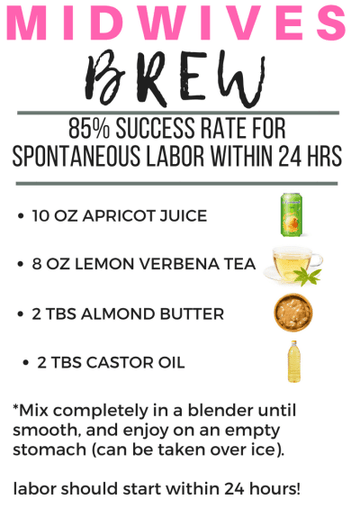Table of Contents
- 1. What Is Midwives Brew?
- 2. What Does Midwives Brew Consist Of?
- 3. How Long Does It Take For midwives to Work?
- 4. When Is The Right Time to Drink Midwives Brew?
- 5. Side Effects of Midwives Brew
- 6. Midwives Brew Recipe
- 7. Is Midwives Brew Effective?
- 8. Alternatives to Midwives Brew
- 9. How To Prepare for Labor Induction
Motherhood is a beautiful blessing and those nine months are the most beautiful months of life. As the delivery date approaches, it gets much more exciting, but when the date passes by, and the baby doesn’t seem to budge at all, nothing can be scarier.
This delay can be very uncomfortable and daunting. If this is why you’re searching for remedies or ways that can induce labor, then you’re at the right place.
There are several ways you can induce labor, but midwives brew is one of the most popular and natural methods you can try. Besides, it is absolutely safe.
1. What Is Midwives Brew?
This is a natural brew made of ingredients that can induce labor quickly and easily. Few mothers complete the nine-month term and still do not induce labor. For them, these labor inducing tricks work perfectly. Right after drinking this, the pregnant woman would induce labor soon followed by delivery.
This is called so because this recipe was used by midwives to induce pregnancy. It originated in Europe, and due to its efficacy, it quickly spread to the other part of this world.
With time the midwives brew became popular and had plenty of success stories. The recipe has all-natural ingredients, and it takes a few minutes to brew it.
This can be consumed anytime, as preferred by the pregnant woman.
Though it is safe, it is always recommended to talk to a doctor or a midwife before consuming it.
2. What Does Midwives Brew Consist Of?

Midwives brew consists of natural ingredients that are absolutely harmless. These ingredients vary from country to country, but they are very similar ingredients in different combinations.
The most commonly used midwives brew ingredients are given below:
- Castor Oil: This is the main ingredient of midwives brew as it is a good laxative and causes spasms in the intestines. Similarly, it can do the same in the uterine muscles as well. This leads to contractions followed by labor.
It’s important to remember that castor oil alone should never be used during pregnancy without consulting a doctor.
- Almond Butter: It is nothing but the fat which is needed to help with spasms.
- Lemon verbena Tea: This is used for taste because it controls the overpowering taste of castor oil. It also has sedative properties that can be used to calm down the pregnant woman during labor.
-
Apricot Juice: This is also used for taste, but it also provides plenty of vitamins and minerals.
3. How Long Does It Take For midwives to Work?

The time taken for midwives brews to induce labor is different for every woman. There is no fixed time for the brew to start working. It may range between a few hours to 24 hours. Few women may get contractions in just 4 to 5 hours while few take 24 hours. If you plan for home delivery, then make sure a midwife is available with you after drinking this brew and if you are planning a hospital delivery, then be prepared to visit the hospital as soon as the labor period starts.
4. When Is The Right Time to Drink Midwives Brew?
You must be eager to see your baby and may want to try this brew as early as possible, but we do not recommend this until at least 40 weeks of pregnancy as early delivery may result in the birth of a premature baby.
This may result in many health complications.
It is best you complete the nine months term before you try the brew.
It is best to wait till your delivery date, and then you can try it for a natural delivery.
Drinking the brew preterm means you are forcing delivery. When your body and your baby aren’t ready for labor, forcing it through the brew may lead to a cesarean section instead of natural delivery.
So, it’s best to let your baby grow completely in your womb before you bring it to this world.
The 36th week of pregnancy is your 9th month, and it’s not advised to drink this brew at this stage without waiting for natural contractions unless your doctor has suggested.
Coming to the best time to drink, it is in the early morning on an empty stomach. It takes a few minutes to prepare, and hence you can prepare and drink it immediately at room temperature or luke-warm.
Drink it within 30 minutes of preparing for the best results.
5. Side Effects of Midwives Brew
It’s true that it’s natural; yet, there may be certain side effects to certain women but not all. Here are a few side effects you need to observe.
- Nausea and Vomiting: The taste of castor oil is not liked by many, and this may happen to certain women during pregnancy. This may make you feel nauseated and lead to vomiting.
- Dizziness: This is also due to castor oil. So, have someone with you when you drink this brew to take care of you in case you feel dizzy.
- Dehydration and Diarrhoea: This is a good laxative and can cause diarrhea, which in return may result in dehydration. Diarrhea causes fluid loss because it draws a lot of water from the intestinal walls to make you poop easily.
- Fatigue: Lemon Verbena tea can cause you to feel fatigued. So, it’s suggested to take some rest if you feel so. This should go away soon.
- Irregular Contractions : Though castor oil causes the spasms and leads to contractions, these may be irregular, causing more pain than usual in some women.
- Dangerous for Baby: If you take it before completing the term, it can become dangerous for your baby leading to complications, which are because of preterm delivery and not the brew actually.
- Allergy: If you are allergic to the almonds, then this brew may give you allergic reactions as it consists of almond butter. In this case, you can use an alternative to this butter. If you are not sure if you are allergic to almonds, you must consult your doctor regarding the same.
Similarly, some women are allergic to apricots, which is very rare. You can use any alternative juice in your recipe.
6. Midwives Brew Recipe
There are plenty of recipes used worldwide with slight variations, but most of them are almost the same. Here is the most used and most common recipe you can try.
Ingredients
- Castor Oil - 2 tsp
- Lemon Verbena Tea - 250 ml
- Almond Butter - 2 tbsp
- Apricot Juice - 300 ml
Preparation Method
- Take a pan and add some water and keep it to boil for some time.
- Turn off the stove and pour it into a cup.
- Grab a lemon verbena tea bag and place it in the cup and leave it for 10 minutes.
- Now, remove the teabag and blend all the remaining ingredients with this cup of tea.
- The result should be well blended smooth paste.
Alternatives to Allergens
You might be allergic to certain ingredients like almonds and apricots, and thus, it’s important to know which alternative you can use to replace them. Not just allergens but those ingredients which are not found at your place easily can also be replaced.
- Lemon Verbena Tea: Use mango nectar instead of lemon verbena tea if it’s not available at your place.
-
Apricot Juice: Some women might be allergic to apricots. In this case, they can use pineapple juice as an alternative in the midwives' brew.

7. Is Midwives Brew Effective?
No doubt, there are plenty of anecdotal reports or success stories of this brew, but there’s a lack of evidence through the research behind it.
If you look at the scientific evidence on the effectiveness of this recipe, then you may not find much.
According to a study conducted on 103 women of at least 40 weeks pregnant, half of them were given castor oil while the other half were not. 60% of those given with castor oil were in labor in just 24 hours, and among these, 80% of women had given vaginal birth to their babies.
But the results of another study published in 2009 were not very enthusiastic. It says the castor oil is neither helpful nor harmful in terms to induce labor.
However, a study conducted in 2013 had shown the effectiveness of castor oil. But the quality of the studies may make the results doubtful. They observed that all the women who participated in this study felt nauseous after taking castor oil.
A 2012 study claims that post-term pregnant ladies are three times more prone to get contractions within 12 hours of taking castor oil.
So, we cannot rely on the results as they were conducted only on castor oil but not the brew. However, there are people who claim its effectiveness for both castor oil and the brew.
8. Alternatives to Midwives Brew
If you hate the taste of midwives brew and want to try alternatives, then here are a few you can try.
- Exercise: Let the heart rate go up, and it won’t take long to induce labor if you are 40 weeks pregnant. Go for long walks or climb stairs. Make sure it doesn’t strain you too much.
- Red Raspberry Leaf Tea: It doesn’t induce labor as quickly as the midwives brew does, but it still works well. It can keep you well-hydrated and strengthen your uterus, preparing you to induce labor.
-
Acupressure: This is one of the methods to induce labor as it can raise oxytocin levels in the body, which is needed for contractions. Acupuncture is another alternative to this.
9. How To Prepare for Labor Induction
Before you try any home remedy for labor induction, it’s very important to know how to prepare for labor induction because if you understand the labor induction process and your own body, you must not mess up anything.
What should you do?
- Know Your Cervix: You must understand your cervix. Your doctor may do a vaginal check and calculate Bishop’s score to know how likely induction can induce labor. It’s important to know whether your cervix is ready to open.
-
Check If Midwives Brew Is Right For You: There are plenty of labor induction processes available, and not all the options are suitable for every woman. Based on your present health condition, your midwife or doctor may advise whether you can take the brew or not.
Talk To Your Doctor
Never try any home remedy to induce labor yourself at home. You might have heard someone try a recipe at home and succeeded but remember that every woman is different.
Your body is different from others.
So, it’s essential to consult your doctor before trying this midwives brew or any other home remedy yourself.
The last few days might feel like another nine months again as you try to prepare yourself to induce labor and childbirth.
You sure are very excited and nervous at the same time.
If you want to induce labor yourself at home, especially when you plan home delivery, then midwives brew is all you need.
However, it’s very important to complete your nine months terms and consult your doctor before you try it yourself.
